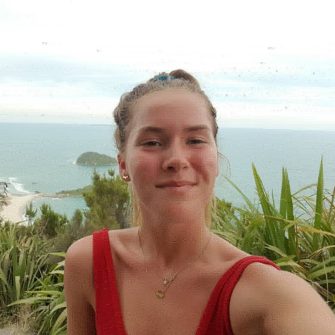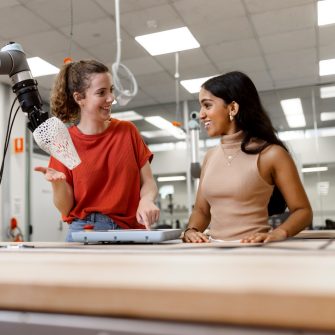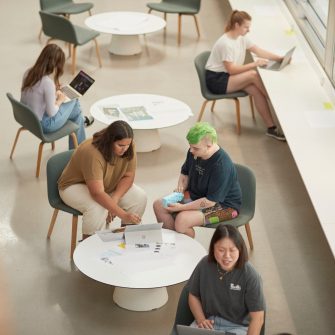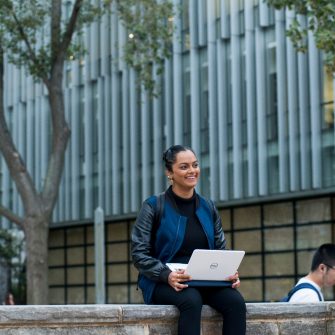Bachelor of Media / Social Sciences
- Commencing Terms
- Term 1, 2 & 3
- Duration
- 4 Year(s)
- Delivery Mode
- Face-to-face (includes blended)
- Campus
-
Kensington
- Codes
- UAC code 422302
- Program code 3345
- CRICOS code 110678E
-
ATAR/2025 lowest selection rank
- 80.0 View all admission criteria
-
2026 Indicative first year full fee
- $17,000*
-
2026 Indicative full fee to complete degree
- $69,000*
-
2026 Indicative first year full fee
- $48,500*
-
2026 Indicative full fee to complete degree
- $209,500*

Application closures for 2026
Undergraduate programs for 2026 intakes are closed for New Overseas Student Commencement (NOSC) applications. Applications for postgraduate programs remain open. Find out if this closure applies to you.
- Overview
- Entry requirements
- What will I study?
- Future careers
- How to apply
- Fees & Scholarships
Overview
The Bachelor of Media / Bachelor of Social Sciences program is a four-year double degree that develops meaningful communication skills and prepares you for making authentic societal impacts. Learn strategies to interest, inform, and inspire others while discovering how to bring about positive change through political influence.
Social scientists inform public debate and shape the policies that affect society. They analyse and understand myriad political, international, social, environmental, and economic challenges through social research skills and real-life experience. You’ll blend comprehensive social knowledge and analytical skills with specialist strategies for public relations and advertising, communications and journalism, screen production, cinema studies, or media studies.
Prepare to enlighten the future through creative thinking, problem-solving, professional persuasion, and communication. You'll build industry knowledge, learning from experts in practical and theoretical classes. With solid opportunities for work experiences in Australia and overseas, you’ll unlock the expertise needed to establish a global career with a positive impact.
Key features
World-leading researchers and practitioners
Learn from teachers who are also world-leading researchers, breaking new ground in understanding how media work, from artificial intelligence to activism, to the politics of race and gender. Have your skills honed by experienced practitioners, many of whom still make films, grow brands, and write for leading publications. Glean deep insights from industry leaders who appear as guest speakers in the classroom.
Purpose-driven community
Become part of a collective dedicated to solving global issues. Diverse classmates, teachers, researchers, and practitioners support your goals and share knowledge. Develop influential diplomacy and collaboration skills through student-led organisations and volunteer groups. Our community focuses on resolving global challenges through collaboration.
Practical experience, here and overseas
Take advantage of our opportunities to build outstanding employability. Learn industry technologies in state-of-the-art production spaces. Connect with our industry partners on internships or international projects. Confidence comes with experience, and this double degree integrates professional development at every level.
Why study at UNSW?
- We're ranked #1 in Australia and =#23 globally for social sciences and management (QS World University Rankings by Subject, 2025)
- State-of-the-art production spaces
- Practical, work-integrated courses
- Access close ties to the media industry
- International study exchange opportunities
- A diverse, creative, and inclusive community
- Connect with a global alumni network
Want to see more from UNSW Arts, Design & Architecture?
Entry requirements
-
- The 2025 Lowest Selection Rank (LSR) is the adjusted rank (ATAR plus adjustment factors) you would have needed to gain entry to this degree in 2025.
- The 2025 A levels score is based on four Advanced Level (A2) subjects. Entry scores are calculated from the best three or four A2 subjects (excluding repeated subjects) using the following values: A*=6, A=5, B=4, C=3, D=2, E=1. At most one Applied A Level subject may be included in the best four subjects used to calculate the aggregate.
- The 2025 IB Diploma is an indication of the IB you would have needed to gain entry to this degree in 2025. It is to be used as a guide only.
- The 2025 Lowest ATAR is the lowest ATAR (before adjustment factors were applied) to which an offer was made. Where <5 is listed, this indicates that less than 5 ATAR-based offers were made and so the score has not been published. N/A indicates no offers were made on the basis of ATAR.
*The Lowest ATAR to which an offer was made, for this program, is based on a UNSW Gateway Early Conditional Offer.
-
At UNSW, we are committed to ensuring prospective students have all the information they need in order to make informed decisions about their study options.
To assist you in gaining a better understanding of how Admissions works at UNSW, we have provided you with a summary of ATAR offers and the student profile.
We hope this information will help you identify the degree that is right for you.
Portfolio Entry
At UNSW ADA, you will find the freedom and support to design the future you want. An ADA Portfolio Entry submission will demonstrate your passions alongside your best work, to boost your chances of admission to a bachelor’s degree of your choice. For more information and to see specific guidelines for portfolio submissions visit UNSW Portfolio Entry.
Assumed knowledge
None
Demonstrate your passions and skills alongside your ATAR. Depending on your preferred degree, you'll complete either a critical reflection or a portfolio, with successful applicants receiving an early conditional offer with an adjusted ATAR entry requirement for their preferred degree. [See more information about UNSW Admission Pathways](https://www.unsw.edu.au/study/how-to-apply/undergraduate/admission-pathways/portfolio-entry).
Adjustment Factors
We offer a range of adjustment factor schemes that reward students for academic performance and extra-curricular achievements. These schemes also take into account a range of personal and educational disadvantages that may have affected your studies.
HSC Plus
This scheme rewards students who perform well in Year 12 subjects that are relevant to their preferred UNSW degree. You may be awarded up to five points.
Elite Athletes, Performers and Leaders (EAPL)
This program recognises achievements in the areas of sport, academia, leadership and music at an elite level. You may be eligible for up to five points.
Educational Access Scheme (EAS)
Factors such as illness, financial hardship, language difficulties or attending a particular school can mean you don't always get the best possible marks in Years 11 and 12. If one of these situations applies to you, submit an application for the Educational Access Scheme (EAS) via UAC. Eligible students can receive between 1 and 10 points towards their chosen UNSW degree.
Admission pathways
Your ATAR is not the only measure of your potential to succeed, which is why we offer a range of pathways into university. Explore your options below and get in touch with our Future Student Advisers to discuss your path to UNSW.
Gateway Admission Pathway
This scheme is open to students who attend Gateway schools, live in a low-socioeconomic area based on IRSAD and IEO indexes of SEIFA criteria, or are an Aboriginal and Torres Strait Islander person. It adjusts the ATAR requirements for your preferred UNSW degree and provides early offers and early conditional offers to UNSW.
Entry programs for Australian Aboriginal and Torres Strait Islander people
We offer entry programs for Indigenous Australians, including the Indigenous Preparatory Programs and the Indigenous Admission Scheme (IAS). The entry pathway program you apply for will depend on the degree you want to study.
University Preparation Program
If you want to study at UNSW but faced challenges in year 11 and 12 that make you eligible for the UNSW ACCESS Scheme, but you don't meet the cut-off for degree entry, consider the University Preparation Program.
The University Preparation Program is a one-year pathway to a UNSW degree place. You'll study subjects that allow you to develop your academic skills, including maths skills if needed, so that you can achieve your best results. You also study degree level courses from week one, to give you a realistic introduction to university level study. If you do well in these courses you can earn course credit towards your degree.
English language requirements
You may be asked to provide evidence of your English proficiency to study at UNSW depending on your educational background and citizenship. English language skills are vitally important for coping with lectures, tutorials, assignments and examinations - this is why UNSW requires a minimum English language competency for enrolment.
If you’re completing an Australian Year 12 qualification (e.g. NSW HSC or equivalent), you do not need to provide anything extra to prove your proficiency. Your qualification will be used as evidence of your English proficiency.
If you do need to provide evidence of your English proficiency, this will be indicated in your application. You can prove this by providing evidence that you meet one or more of the following criteria:
- English language tests and university English courses
- Prior study in the medium of English
- Other qualifications
If you need to improve your English skills before you start your degree, UNSW College’s Academic English Programs are for you. The programs are suitable for various English levels and help you prepare for university studies and life in Australia.
For more details, visit the English Language Requirements page.
International direct entry
Information for applicants with CBSE, HKDSE or Singapore A Levels Qualification
Calculating your CBSE Score:
Awarded by CBSE, average percentage marks across English or Hindi, and your best four remaining subjects. Where marks are given as a range, the mid-point for that range is used e.g. 75 to 80 = 77.5.
Calculating your HKDSE Score:
Entry requirements are based on the aggregate of the best 5 achieved category A subjects (category B and C subjects are not considered).
For subjects other than Citizenship and Social Development: level 5**=7 points, level 5*=6 points, level 5=5 points, level 4=4 points, level 3=3 points, level 2=2 points, level 1=1 point, Level U=0 point.
For subject Citizenship and Social Development: Attained=2 points, Unattained=0 point. Citizenship and Social Development will only be counted towards the aggregate if the 2 points awarded for Attained ranks among the student’s best five scoring subjects.
If Mathematics Compulsory Part and Extended Part (Module 1 or 2) are both presented, both scores can be counted.
Calculating your Singapore A Levels:
Due to significant changes to the GCE A-Level Curriculum and University Admissions Score (UAS) calculation effective 2026, UNSW assessment is currently under review.
Note: Entry requirements published on this page are correct as of the day of publication and may change without notice.
We do not accept secondary qualifications from this country. We may accept tertiary study results, please contact us for more information.
Please contact us for direct entry requirements.
Admission pathways
If you do not meet the requirements for direct entry into your chosen degree, you may be eligible for a pathway program with UNSW College. UNSW College provides alternative entry options using university-approved content so that you can start your UNSW journey with confidence.
English language requirements
You may be asked to provide evidence of your English proficiency to study at UNSW depending on whether you are from an English-speaking background or non-English speaking background. English language skills are vitally important for coping with lectures, tutorials, assignments and examinations - this is why UNSW requires a minimum English language competency for enrolment.
If English is not your first language, you’ll need to provide proof of your English proficiency before you can be given an offer to study at UNSW. You can do this by providing evidence that you meet one or more of the following criteria:
- English language tests and university English courses
- Prior study in the medium of English
- Other qualifications
If you need to improve your English skills before you start your degree, UNSW College’s Academic English Programs are for you. The programs are suitable for various English levels and help you prepare for university studies and life in Australia.
For more details, visit the English Language Requirements page.
Check the specific English language requirements for this program
What will I study?
UNSW is introducing a new academic calendar from 2028.
We are moving to a new flex-semester calendar. What does this mean for your studies?
Study areas
Combine your interests for a unique career connected to your talents and passions. In a double degree, you focus on two areas of expertise to graduate with more knowledge, skills, and career options. Despite the name, it's not double the workload. A double degree combines the core components of two programs. You'll graduate with two certificates sooner than studying two consecutive degrees. Choose one media specialisation and one social sciences major.
Full program structure
In the Bachelor of Media / Bachelor of Social Sciences you’ll choose a specialisation in media and in social sciences. The program consists of 32 individual courses, which are the 16 disciplinary courses of each degree. As a full-time student, you’ll typically study eight courses a year. You can study part-time and also take advantage of a flexible study load. For detailed information on the full program structure, visit the handbook.
-
-
Whether you want to study more or fewer courses in any term, the choice is yours. Our flexible academic calendar means you can graduate faster or take your time to study abroad, complete an additional internship, or fit your study around other commitments.
-
Broaden your horizons and study overseas for a term. Choose an international exchange at one of UNSW’s 300 partners in more than 30 countries. UNSW encourages a global mindset, which means overseas study can count towards your degree. You may also be eligible for financial support to help cover international studies costs.
-
Whether you have a learning difficulty or could benefit from extra guidance, you’ll find free UNSW academic skills support such as toolkits, tutors, and workshops. UNSW Arts, Design and Architecture students and academics are supportive, diverse, and inclusive – it’s easy to ask for advice.
-
Future careers
More than just a foot in the door or a pathway towards landing your first job, this degree will set you up with the professional and creative skills you’ll need to thrive throughout your career. Turn your time with us into a future that celebrates your passion and purpose.
-
- Advocate
- Campaign manager
- Department of Foreign Affairs and Trade official
- International business consultant
- Local government official
- Non-government organisation official
- Policy analyst
- Political adviser
- Political journalist
- Project officer
- Program manager
- Research consultant
- Research officer
- Tourism and trade adviser
- United Nations official
-
- Advertising strategist
- Advertising account executive
- Communications officer
- Content producer
- Community engagement adviser
- Digital communications coordinator
- Government media adviser
- Journalist or feature writer
- Internal communications specialist
- Marketing executive
- Media account executive
- Media relations adviser
- Public relations consultant
- Social media manager
- Video presenter
-
- Animator
- App developer
- Advertising creative
- Cinematographer
- Digital editor
- Digital producer
- Filmmaker
- Game designer
- Interactive media designer
- Screenwriter
- Sound producer
- Television producer
- Video producer
- Website content manager
How to apply
Applications for undergraduate study from domestic students (Australian citizens, Australian permanent residents, Australian permanent humanitarian visa holders and New Zealand citizens) are processed by the Universities Admissions Centre (UAC).
Visit the Apply section of the UAC website and you can nominate up to five degrees in order of preference, with the first being your most desired degree and university.
On-time applications for admission usually close at the end of September each year for Term 1 admission. Late applications can be submitted, but a late fee will apply. For study starting in Term 1, the majority of offers are made in December and January. Visit the UAC website for key dates for admission outside of Term 1.
Ready to start your application?
For most international students, applications are submitted via our Apply Online service. We encourage you to submit your completed application as early as possible to ensure it will be processed in time for your preferred term.
Some high-demand programs with limited places, may have an earlier application deadline or may have an earlier commencement date. For details, visit the international admissions information page.
*If you are an international student studying an Australian qualification, go to the Universities Admission Centre (UAC) for application and UAC key dates. Note: If you are under 18 years of age, you need to make special arrangements. For details, visit the under 18 international students page.
Ready to start your application?
Fees & Scholarships
Commonwealth Supported Place: Student Contribution Band 4
*The student contribution for a Commonwealth Supported Place is an indication only of the amount payable in Year 1 based on a standard full-time load of 48 credit points (1.0 EFTSL). The actual student contribution you will be liable for depends on your individual program of study and the calendar year in which you enrol. Actual fees are calculated upon enrolment. Student contribution amounts are subject to annual review by the university and may increase each year during your studies (subject to caps determined by the Australian Government), effective at the start of each calendar year.
The indicative fees listed here are based on an estimated average and are for tuition only - other fees and charges are not included.
*Fees are subject to annual review by the University and may increase annually, with the new fees effective from the start of each calendar year. The indicative fees listed here are based on an estimated average and are for tuition only, other fees and charges are not included. The amount you pay will vary depending on the calendar year to enrol, the courses you select and whether your study load is more or less than 1 Equivalent Full Time Student Load (8 courses per year).
Indicative fees are a guide for comparison only based on current conditions and available data. You should not rely on indicative fees. More information on fees can be found at the UNSW fees website.
Indicative fees to complete the program have been calculated based on a percentage increase for every year of the program. Fee increases are assessed annually and may exceed the indicative figures listed here.
Indicative fees to complete the program include tuition plus an estimate of study-related costs of approximately $1,000 per year. To find out more about other costs, visit UNSW International.
Scholarships
At UNSW, we award over $83 million in scholarships each year. We pride ourselves on rewarding excellence and making university accessible to students from all walks of life. Whether you’re a domestic or international student, our range of scholarships, prizes and awards can support your journey.
Progress starts here – at a world-leading university

Top 20 Worldwide
Ranked in the global top 20 for three consecutive years
QS World University Rankings, 2024–2026

Winner of the AFR Most Employable University Award six years in a row
AFR Top100 Future Leaders Awards, 2020–2025

Australia's #1 for Innovation
Highest number of startups and spinouts from university-developed tech
SCOPR report, 2024





